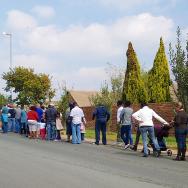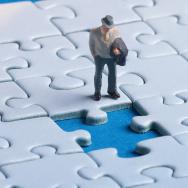Most voters are looking forward to an Election Day victory. According to a recent survey of U.S. households, 87% of Democrats expect Joe Biden to win the presidency while 84% of Republicans expect Donald Trump to stay in the White House, with both sides having a high degree of confidence in their predictions.
The survey not only highlights political polarization, but reveals that voters tend to express starkly different outlooks about the future under a Biden or Trump administration. This situation carries economic risk: If Americans foresee an economic downturn, they may constrain their aggregate spending.
The findings are detailed in a new working paper co-authored by Assoc. Prof. Michael Weber of the University of Chicago Booth School of Business. He and his fellow researchers used an online survey tool to ask 5,000 people about their political views, economic expectations and voting intentions. The survey, which ran from Oct. 19-21, collected information about political affiliations, voting plans, preferred news sources, savings patterns, anticipated income and spending, and more.
Among respondents, 41% said they leaned Republican and 36% leaned Democrat, with the rest identifying as neither. Trump and Biden were nearly tied in the survey, with 44 percent for Trump and 43 percent for Biden. (By contrast, as of Oct. 28, the average of national polls reported by the data-journalism site FiveThirtyEight had Biden leading Trump by 8.5 percentage points.)
The average Republican respondent gave Trump a 76% chance of winning, and Democratic respondents put Biden’s chances almost as high. Meanwhile, 20% of Republicans and 15% of Democrats said their candidate had a 100% chance of winning, a prediction with which no one from the opposite party agreed.
A macroeconomist who focuses on international and household finance, Weber co-authored the paper with Olivier Coibion of the University of Texas and Yuriy Gorodnichenko of the University of California, Berkeley.
“We all have different political preferences. But despite wanting different things, voters should be able to broadly agree on the likelihood of different electoral outcomes given that much of the relevant polling information is publicly available,” write the researchers. “This is, in fact, far from being the case.”
Some of this could be explained by voters watching TV channels with different political leanings, the researchers acknowledge. And yet, when they showed survey participants recent polling data from different sources, the respondents didn’t change their views, regardless of the source. “The views of many individuals of either party are so tightly held that they are unaffected by information that calls for a more nuanced view,” write the researchers.
Only when respondents saw predictions that included a clear margin of error did they move away from their more confident, extreme predictions. Voters might be able to find more common ground, the researchers argue, if news reports were to make clearer the uncertainty involved in poll predictions.
The polarization suggested by the survey results could have economic implications, as people’s political views shape their economic expectations.
In the survey, respondents predicted a positive future under an administration led by their preferred winning candidate but were pessimistic about what would transpire under the opponent. People’s predictions about the economy can in turn affect their spending, and a sizable percentage of the US population may tighten their budgets after the election—a situation Coibion, Gorodnichenko and Weber think is likely to occur.
“These results suggest that the upcoming elections might trigger a decline in aggregate consumption after the Presidential election, as members of the losing party adopt a much more pessimistic outlook while those of the winning party maintain their previous optimism,” they write.
The economy is hardly the only thing imperiled by the gap separating Republicans and Democrats, however. The researchers note that current trends of polarization threaten to undermine electoral outcomes and potentially destabilize the current political system.
—A version of this story was first published by Chicago Booth Review.

